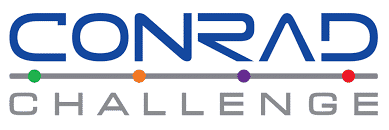The Conrad Challenge 2020 Virtual Innovation Summit, the first time the annual Innovation Summit was run online, was a success. It concluded on Friday, May 29 with seven teams awarded top honors as “Pete Conrad Scholars” in their respective competition categories. Overall, more than 600 teams of 2-5 students between the ages of 13-18 entered the competition beginning in August, a new record, and 37 finalists competed in last week’s virtual summit.
SMART Technologies sponsored the special category, Transforming Education Through Technology, for the second consecutive year. During the Virtual Innovation Summit, leaders from the company hosted a Cosmic Chat, Evolving & Transforming the Future of Work & Education, along with other experts in education, science and technology. The informative panel discussion was led by Jeff Lowe, Executive Vice President of SMART Technologies, and included the following experts: Maria Watanabe, Ph.D. candidate, Biological and Biomedical Sciences, Harvard & MIT; Matt Wallace, SMART Technologies Education Strategist; and Stephen Heppell, CEO Heppell.net and Professor at Universidad Camilo José Cela, Madrid.
Cosmic Chat with SMART Technologies
Lowe noted the importance of the Conrad Challenge as an inspirational and empowering summit that instills confidence in a smarter and brighter future. After introducing the panel of experts, Lowe launched into answering important questions posed by viewers of the live stream. He started the discussion by asking the panel to analyze how education is working for students in the COVID-19 climate, and making connections stood out as a big issue. Most of all, the consistent interaction between teacher and student appears richly missed and hard to replicate, even through quality technology.
The panel continued the discussion by looking at the most significant issues facing education moving forward. Along with the human connection and social-emotional stability, the idea of equity emerged. According to Watanabe, “I see a huge equity gap in education. It’s not just accessibility but about societal inequality. COVID-19 has highlighted these issues. I have students that do not have laptops at home and cannot just jump online and do the homework assignments. In the future, what are we going to do about this? Is the government going to step in, or are teachers?”
The unpredictability of the future became a topic of discussion as well as the overall mental health of students. Heppell provided a positive suggestion, “Let’s get them back and hear what kids have gained, not what they have lost.” Flexibility and openness to change were also highlighted.
The discussion concluded with vital skill takeaways from COVID-19, and the panelists suggested the 4Cs―communication, collaboration, critical thinking, and creativity―as paramount areas of concentration. Wallace’s suggestion of being “recklessly brave” and accepting failure as part of the journey highlighted the session wrap-up.
Student Teams: Transforming Education Through Technology
Following the Cosmic Chat, the finalist teams in the Transforming Education Through Technology category delivered their Power Pitches and engaged in a live Q&A with the judges. The following teams competed:
• Cheat Sheet (North Carolina) – These students created a pre-formatted notebook and AI-enabled application to compile notes.
• StutterLess (California) – This inexpensive, personalized, Python-based mobile app helps users overcome stuttering by simulating traditional therapy.
• Lucidity (California) – This team presented their web application that aims to make school, home, and work environments more productive to combat internet addiction.
• Scintilla (California) – These young innovators created an educational virtual reality platform to help students learn in a fun and entertaining way.
• Spokescience (Arizona, California, Massachusetts and New Hampshire) – This team designed a platform that enables researchers to connect with science-oriented and environmentally conscious social media influencers.
All participants performed incredibly well through both the pitch presentations and the Q&A format, but in the end, only one team could be awarded the top honor. StutterLess were named to the Pete Conrad Scholars, the competition’s top award for the winning team in each category, named in honor of Apollo 12 astronaut Charles “Pete” Conrad and his three-decade pursuit of innovation and entrepreneurship. Team StutterLess delivered the following Power Pitch:
To learn more about the 2019-20 winners, visit www.conradchallenge.org/2020-summit-awards. Students and educators interested in participating in the 2020-21 Challenge can sign up to receive more information by visiting this page.


